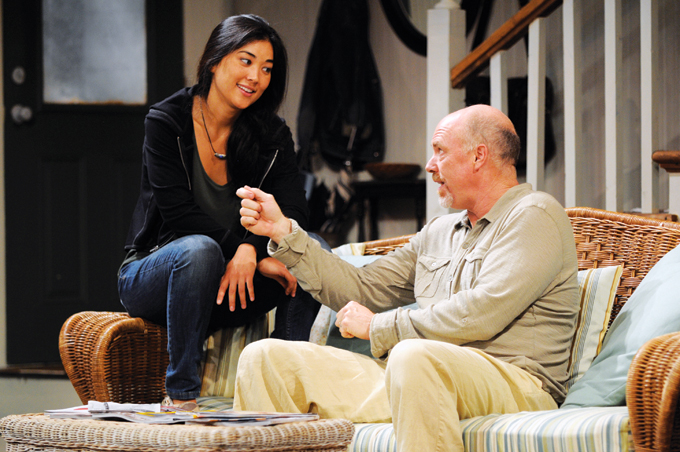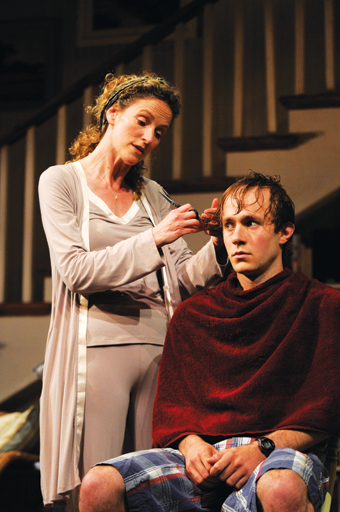Between Love and Oblivion
by Anthony Chase

Kate Fodor’s Fifty Ways at Chautauqua
In her new play, Fifty Ways, now playing its debut engagement at Chautauqua Theater Company’s Bratton Theater, Kate Fodor explores the potent but ambiguous states of emotion that lie in the balance between loving and not loving, between forgiving and not forgiving, between moral obligation and freedom from obligation.
These are speculative states of being:
“Would I still love you if…?”
“Could I forgive you if…?”
“Would I stay with you if…?”
We may think we know the answers to these questions, but we never really do. We can never know in which of the 50 ways we might leave our lovers until fate actually delivers us to the crossroads of decision.
Fodor is a playwright who enjoys the collision of powerfully incompatible emotions. In her play 100 Saints You Should Know, she explored the competing issues associated with faith, love, duty, and desire when a priest leaves his calling and returns to the home of his uncomprehending mother.
In her next play, Rx, she took a delightfully comic frolic through ambition, futility, and desire set against the backdrop of the fiercely competitive pharmaceutical industry. That play involved a drug that actually promised to reverse the appropriate emotional response to tedium, keeping a person cheerful and motivated, even through the most heinously meaningless workday.
Fodor’s gift is to understand the algebra of human emotion, and to toss variables into the mix that send her characters skidding off in unexpected directions. Indeed, her plays have a nearly mathematical balance as they tease actions out of their characters’ desires and failings. Fodor feeds on the fact that human beings may think that we are reasonable and logical, but we aren’t.
In Fifty Ways we meet Nina. She is a marvelously insightful and charismatic person who has difficulty accepting imperfection. When we first see her, she is reclining in the living room of her summerhouse in Woodstock, New York, expounding upon the ways in which her home’s imperfections bark at her. She is not merely speaking of home repair. She is unaware, however, that she is speaking to no one; her disconnection from others will be a theme of the play.

Nina is married to a modestly successful novelist named Adam, with whom she has a teenage son named Grant. Her step-sister, Zoe, is a talented but frustrated violinist who is thinking about abandoning her performance career to pursue arts administration. Everyone around Nina admires her and yearns for her approval. There is friction in her marriage, but it doesn’t seem to be anything severe or out of the ordinary. The metaphoric roof over her head may be sagging, but it does not seem to be in danger of crashing down on her.
That is the deceptively simple set up, but Fodor has endowed Nina with an incendiary imperfection. She is a perfectionist. In her inflexible pursuit of flawlessness, Nina withholds approval from her loved ones in a way that is arguably callous. Her husband’s books aren’t as good as they should be; Zoe has never realized her potential as a violinist. Only Grant, the child she adores, escapes Nina’s scathing scrutiny, for Nina seems to need the boy’s approval herself.
Into this equation, Fodor adds one more powerful and inevitable variable, and it turns out to shake Nina’s house to its foundation. Adam falls ill. Thinking that his condition might be serious, Nina reveals to their adolescent son that whatever happens, she staunchly refuses to care for his father in sickness. Her reason, she tells the boy, is that Daddy has violated the marriage contract. Didn’t your vow include “in sickness and in health”? the boys asks. Nina refuses to elaborate, but the audience understands: Having endured Adam’s infidelity, she will not endure his infirmity.
This startling declaration sets a series of confrontations in motion. In the algebra of a Kate Fodor play, every wayward glance and unintended insult has an equal and opposite reaction. Nina has unwittingly alienated Adam and Zoe, and their passively aggressive responses will be profound.
Fodor has a genius for exposing the feeling between two incompatible emotions. Among the most delightful elements of Fifty Ways, for instance, is the consistency with which Nina’s most horrible pronouncements deliver explosions of laughter from the audience. Fodor scores these unexpected laughs again and again: When Nina confesses that her husband’s clean bill of health is a disappointment, because she’d been looking forward to life after his death; when Zoe seeks a compliment for her performance at Tanglewood and Nina lovingly reassures her with, “Well, you told me you were under-rehearsed!” Hilarious! And horrible!
Vivienne Benesch gives a truly exquisite performance as Nina. On the one hand, the actress exudes the compelling maternal warmth of Meryl Streep. At the same time, she forges a character who is externally as hard as nails, but too vulnerable to rescue herself from her own harsh judgments and inflexibility. Benesch melds these contradictory qualities into a real and vivid human being.
In Benesch’s interpretation, Nina is simply too rigid and analytical to understand the irrational underpinnings of her feelings. Indeed, she is logical to the point of absurdity. With no sense of irony, she deploys equal scrutiny to the carving of wainscoting, her husband’s writing, and her son’s school essay. She reveals that even under the influence of the drug ecstasy (which she quite enjoyed) she retreated from language entirely and allowed herself to be absorbed into the fabric of her gorgeous quilt. Nina yearns for oblivion as the only possible respite from her incessant intellect. This is a woman who sees no inconsistency in demanding to know why her husband would fall ill if he is so keen to go to San Francisco. Everything in her world is logically motivated, even illness. She understands the order and balance of a marriage contract, but not the reckless realities of marriage itself.
In a scene in which Kevin, a master carpenter, comes to supervise the repair of Nina’s roof, Nina is entirely disarmed by the man’s lack of pretentiousness, his imperviousness to her scolding, and by his gentle teasing. She is then taken by surprise when he asks her if she has told him that her husband and son are away because she wants him to return later. “Can I think about it?” she asks. Nina must think about everything.
The actors who surround Benesch are also very fine.
Michael Gaston, a veritable fixture on the stages of New York and the nation’s most highly regarded regional theaters, is very affecting as Adam. We feel his building frustration with the wife he adores, but who is in many ways out of his league. Nina may not be able to forgive his weaknesses, but Gaston makes the man so agreeable that we nearly do.
David Aaron Baker, an actor with a resume as impressive as Mr. Gaston’s, is perfection as Kevin, the attractive and surprisingly erudite carpenter. His lone scene with Ms. Benesch provides singular insight into her personality, as Fodor deploys a character who has no investment in Nina’s approval or rejection.
Young Josh Tobin gives a marvelously skillful performance as teenaged Grant. Adolescent characters are a Kate Fodor specialty, and also figure prominently in 100 Saints You Should Know. Like the emotional states that lie between loving and not loving, or forgiving and not forgiving, adolescence itself is an in-between state. Not quite a child and not quite an adult, Grant is making plans for his future and is just experiencing the rush of first love. Tobin never condescends to the character, giving his every action and exclamation sincerity and respectful weight, including the boy’s decision to make a radical change of career goal, in naïve reaction to events in his family. Moreover, the actor reveals Fodor’s adroit ability to show qualities of both parents in their son. Interestingly, because Grant’s reaction to his mother’s cold indifference to others actually inspires the play’s surprisingly optimistic conclusion, a great deal of the weight of the play lies on young Mr. Tobin’s impressively talented shoulders. He is certainly up to the task, and his performance, frankly, blew me away.
Leah Anderson does very nicely with Zoe, the most mechanically written of Fodor’s characters. This is the stepsister who performs atonal music in Nina’s barking home. (Significantly, Adam’s medical screening for cancer is also presented as a crash of barking sounds, and the ailment that signals the climax of the play arrives in the form of increasingly incoherent speech.) Zoe was a little girl when she met her stepsister, who has served a decidedly maternal role in her life. It is a difficult stretch when Zoe goes all Soon-Yi Previn on Nina, and while the motivation is articulated, it does not yet seem entirely supported in the play’s premiere outing. Still, Anderson plays the role with sincerity and authenticity.
The plays at Chautauqua Theater Company are, remarkably, rehearsed in just two weeks. This is an astonishingly quick turnaround, especially for a brand new script. Director Ethan McSweeny has rendered a pleasingly coherent, unified, and satisfying production. He has been especially successful in presenting a narrative that moves gracefully with clearly articulated characters. While the play could use more urgent momentum at times, and there are sequences that would benefit from greater clarity, the work is always thought-provoking, and engaging. We have come to expect an air of theatrical occasion from a Chautauqua Theater Company production, and on that score Fifty Ways more than delivers. It is thrilling to participate in the development of a brand new Kate Fodor play.
There were points at which I wondered, “Where can Fodor be taking us?” I will not give away the ending, but in the play’s final moment, the journey is rewarded with a powerful and surprising glimpse at Nina and Adam’s future, and the legacy they have established in their child. The title of the play suggests a question: Will these lovers leave each other? The playwright reminds us that if we wait long enough, as the marriage vow eloquently states, even when all 50 ways have been exhausted, death, the final way to leave a lover, waits for us all.
When it comes to life’s largest questions—who we love, how we leave—whether there are 50 ways or a million, we often don’t actually get to decide. What matters is not the way, but how we treat each other along the way, and the impact we have had on those we leave behind.
Kate Fodor’s Fifty Ways runs through July 29.
|
Issue Navigation> Issue Index > v11n30 (week of Thursday, July 26) > Between Love and Oblivion This Week's Issue • Artvoice Daily • Artvoice TV • Events Calendar • Classifieds |









 Current Issue
Current Issue